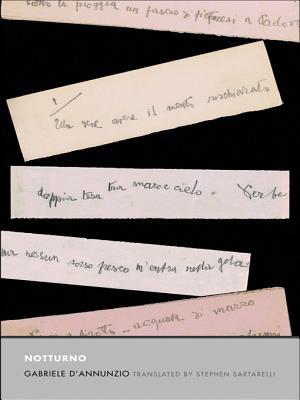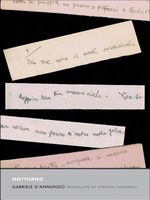- Welcome to FictionDB, Guest
- | My Account
- | Help

Notturno — Gabriele D'Annunzio
Composed during a period of extended bed rest, Gabriele D'Annunzio's Notturno is a moving prose poem in which imagination, experience, and remembrance intertwine. The somber atmosphere of the poem reflects the circumstances of its creation. With his vision threatened and his eyes completely bandaged, D'Annunzio suffered months of near-total blindness and pain-wracked infirmity in 1921, and yet he managed to write on small strips of paper, each wide enough for a single line. When the poet eventually regained his sight, he put together these strips to create the lyrical and innovative Notturno.
In Notturno D'Annunzio forges an original prose that merges aspects of formal poetry and autobiographical narrative. He fuses the darkness and penumbra of the present with the immediate past, haunted by war memories, death, and mourning, and also with the more distant past, revolving mainly around his mother and childhood. In this remarkable translation of the work, Stephen Sartarelli preserves the antiquated style of D'Annunzio's poetic prose and the tension of his rich and difficult harmonies, bringing to contemporary readers the full texture and complexity of a creation forged out of darkness.
In Notturno D'Annunzio forges an original prose that merges aspects of formal poetry and autobiographical narrative. He fuses the darkness and penumbra of the present with the immediate past, haunted by war memories, death, and mourning, and also with the more distant past, revolving mainly around his mother and childhood. In this remarkable translation of the work, Stephen Sartarelli preserves the antiquated style of D'Annunzio's poetic prose and the tension of his rich and difficult harmonies, bringing to contemporary readers the full texture and complexity of a creation forged out of darkness.
Genres
Sub-Genres
Click on any of the links above to see more books like this one.


